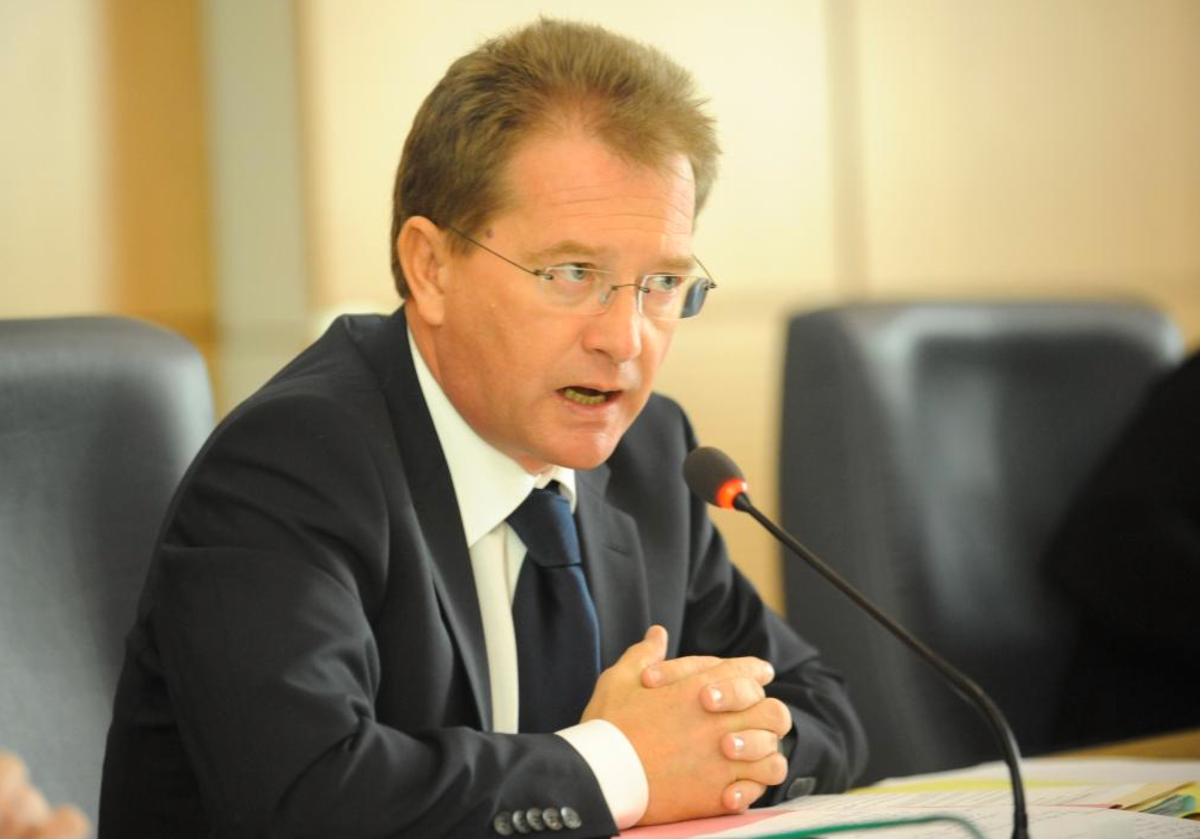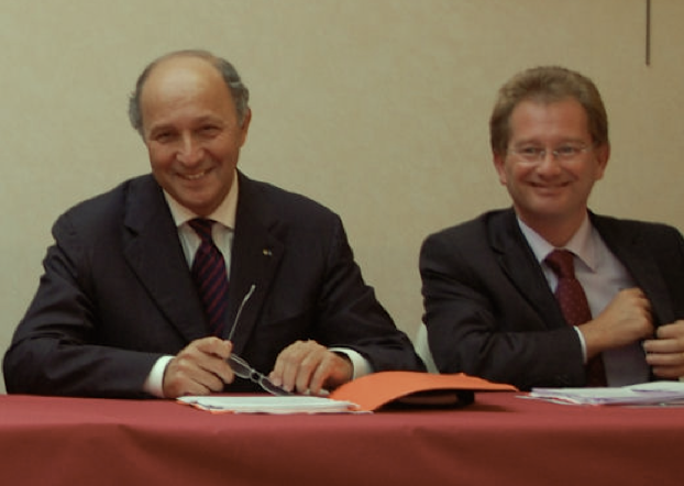Socialist Senator Didier Marie's CV provides ample proof that serving French foreign affairs minister Laurent Fabius can be a remarkably rewarding exercise.
In Marie's case, it was not the result of diplomatic skills employed within the ministry’s grand buildings overlooking the river Seine on the Quai d’Orsay in central Paris, but rather from his loyal services provided in Fabius’s political fiefdom situated some 130 kilometres downriver, in the Seine-Maritime département (equivalent to a county) in northern France.
Since the late 1970s, Fabius, 68, a former prime minister who has also headed four ministries across his lengthy political career, has held numerous local political posts within this north-eastern swathe of Upper Normandy, including as a Member of Parliament (MP), mayor, and municipal and regional councillor.
Re-elected in the last general elections for a ninth time as an MP for a local constituency in the Seine-Maritime département in 2012, he gave up the seat immediately afterwards to serve as foreign minister in then newly-elected President François Hollande’s socialist government.
Locally-born Didier Marie is a longstanding loyal lieutenant to Fabius, his political mentor. Marie became a key aide for Fabius during the 1990s, helping the former prime minister transform the local Socialist Party federation into a base for Fabius’s political movement within the party. On two occasions, he replaced Fabius as MP when the latter served in government.

Enlargement : Illustration 1

President of the Seine-Maritime council from 2004 to 2014, when he became a senator, Marie, a teacher by profession, also accumulated numerous other local political posts.
Between 2010 and 2012, while Fabius sat as an MP in the then socialist opposition, he hired Marie as a highly-paid, full-time parliamentary assistant. Just how Marie was expected to fulfil this role is perplexing given that, at the time, the latter held several positions of responsibility, not least that of president of the Seine-Maritime council (for which he was paid 4,400 euros per month). As head of the council, which administrates an area with a population of more than 1.2 million inhabitants, Didier Marie was in charge of a yearly budget totalling 1.7 billion euros. His wide-ranging responsibilities ranged from overseeing the attribution of welfare aide (such as for those on low incomes and benefits for the elderly), to the appointment of gardes champêtres, the rural wardens with minor policing roles.
He was also vice-president of the ‘agglomeration community’ (a public structure that groups neighbouring municipalities to steer policies on issues including local economic development, urban planning and transport) of the département’s principal town, Rouen. For that post he was paid a monthly 1,460 euros. But on top of this, he was also deputy-mayor of Elbeuf, a small town south of Rouen with a population of just more than 17,000, for which he received a monthly remuneration of 970 euros, as well as serving as president of the principal organization for the management of publicly subsidized housing in the département, called Habitat 76. Together with this, he also received 415 euros per month for sitting on the board of the Paris-Normandie motorway company.
Fabius paid Marie a salary (provided for out of the public funds of the lower house, the National Assembly) of 5,500 euros per month, while the average monthly wage for a parliamentary assistant is about 2,600 euros. Marie’s total monthly income for all the various posts he held amounted to 12,000 euros, which is equivalent to eight times the French minimum wage.
In September 2012, several months after Fabius had given up his seat in parliament following his appointment as foreign minister, Marie was re-employed by Fabius’s speech-writer and successor as MP, Guillaume Bachelay. Marie was still president of the Seine-Maritime council, vice-president of the Rouen ‘agglomeration community’, and deputy-mayor of Elbeuf. Bachelay, a leading figure in the Socialist Party, gave Marie a part-time contract paid 1,900 euros per month.
But the shortfall was swiftly and largely taken care of by the Socialist Party federation in the Seine-Maritime department, one of the wealthiest socialist federations in France, whose chief and close Fabius ally Christophe Bouillon appointed him as a ‘project manager’ (chargé de mission), without the federation’s grass roots members being informed beforehand. The job was supposed to occupy Marie for 14 hours per week.
Meanwhile, the wealth built up by Marie over the years has allowed him to invest in several properties in France and another on the Greek island of Paros, in the Cyclades.
'I have given a lot for the party'
The members of the Seine-Maritime socialist federation only discovered the true scale of the financial arrangements from which Marie benefitted after he became a senator for the region, in 2014. That was when he was required, by a recently-introduced law to promote probity in politics, to detail all his professional activities over the previous five years. The details, which until then were known only to Fabius’s close circle, have angered a number of Socialist Party officials.
In March this year, he placed a new version of his professional interests online, which contains omissions of some information that appeared in his first declaration.

Enlargement : Illustration 2

Contacted by Mediapart, Didier Marie gave an account of his activities as a parliamentary assistant to Fabius. “I was attached to the constituency,” he said. “I informed [Laurent Fabius] about local political activity and I passed down information to our networks.” His explanation is difficult to understand in the context of parliamentary work, especially as he was rarely present at Fabius’s constituency office in Grand-Quevilly, a suburb of Rouen.
Importantly, the political services he said he accomplished were already those he would have engaged in as a local ally of Fabius, and which raises questions over the fact that he received a parallel salary paid out of public funds. Equally questionable is that this politically semi-feudal situation, in which he was a highly-paid servitor to Fabius, placed him, in his role as the president of the Seine-Maritime council, in a subordinate position to one of the département’s 11 MPs.
Also contacted by Mediapart, the now foreign minister’s spokeswoman and communications advisor dismissed suggestions that Marie’s employment as parliamentary assistant amounted to a fake job. “Didier Marie is a man in the field who had a role of political animation,” she said, adding: “He probably organised meetings.” Asked whether there was written evidence of his activities she said she had nothing at hand to offer. On the question of how Didier Marie’s parliamentary assistant’s role could be compatible with his agenda as president of the Seine-Maritime council, she said: “It’s not as if Fabius had employed the president of [the] Burgundy [council],” in a reference to the relative geographical proximity to Paris of the Normandy département.
Mediapart attempted to contact Guillaume Bachelay, who replaced Fabius as MP in 2012 and who re-employed Marie as parliamentary assistant, via numerous emails and phone calls, but he declined to comment.
As for Marie’s work as ‘project manager’ for the Seine-Maritime Socialist Party federation, its boss, Christophe Bouillon, 46, who has headed the local branch of the party since 1997, was just as vague in detailing what such a post involved. “His work for me was to carry out politics,” Bouillon, who is also an MP for the region, told Mediapart. “That consisted of doing what he knew how to do, territorial networking, being present, the preparations for elections.”
Asked whether a local political figure with numerous responsibilities should rather be expected to carry out such militant activities on an unpaid basis, Bouillon replied: “Yes, but that’s your judgment, we’re not at a level of what’s legal. I have no regrets. Now, on the remuneration, when you list the different amounts, it’s true that the question can be put.”
“Financial commissions exist [within each socialist federation] where internal opposition can be expressed,” he continued. “Questions have to be asked for answers to appear. The questions were not put.”
Didier Marie gave Mediapart a similar, if succinct, reply about his work for the federation. “As Christophe Bouillon’s project manager I carried out politics,” he said. “I have nothing to reproach myself about, I have given a lot for the party. I didn’t turn up at 9 o’clock in the morning to open the windows, sweep the floor and switch the computer on.”
“Each one can make a judgment on the amount of my remuneration, but it poses no legal problem," he added. “If you compare [it] with the remunerations of managers in a lot of fields, like those in consultancy companies, there is nothing extravagant about it.”
“When you look at the PS [Socialist Party] today, you have an astronomic proportion of elected representatives who are also collaborators for MPs or senators, collaborators of town halls or party offices,” Marie continued. “My case is rather a generality.”
While it might be argued that Marie’s case is more an acute example of such practices, the ‘professionalization’ of French political life does indeed appear to be progressing, and Mediapart’s investigation into the workings of the Socialist Party federation in the Seine-Maritime département reveals a career-minded system pushed to the extreme. In that context, it is interesting to note Laurent Fabius’s comments in a radio interview last September. “When young folk come to see me saying ‘Monsieur, I want to go into politics’ I always say to them ‘First, try to get a profession’”, Fabius told France Inter radio. “Politics is not a profession, you must grasp the reality.”
-------------------------
- The French version of this article can be found here.
English version by Graham Tearse


